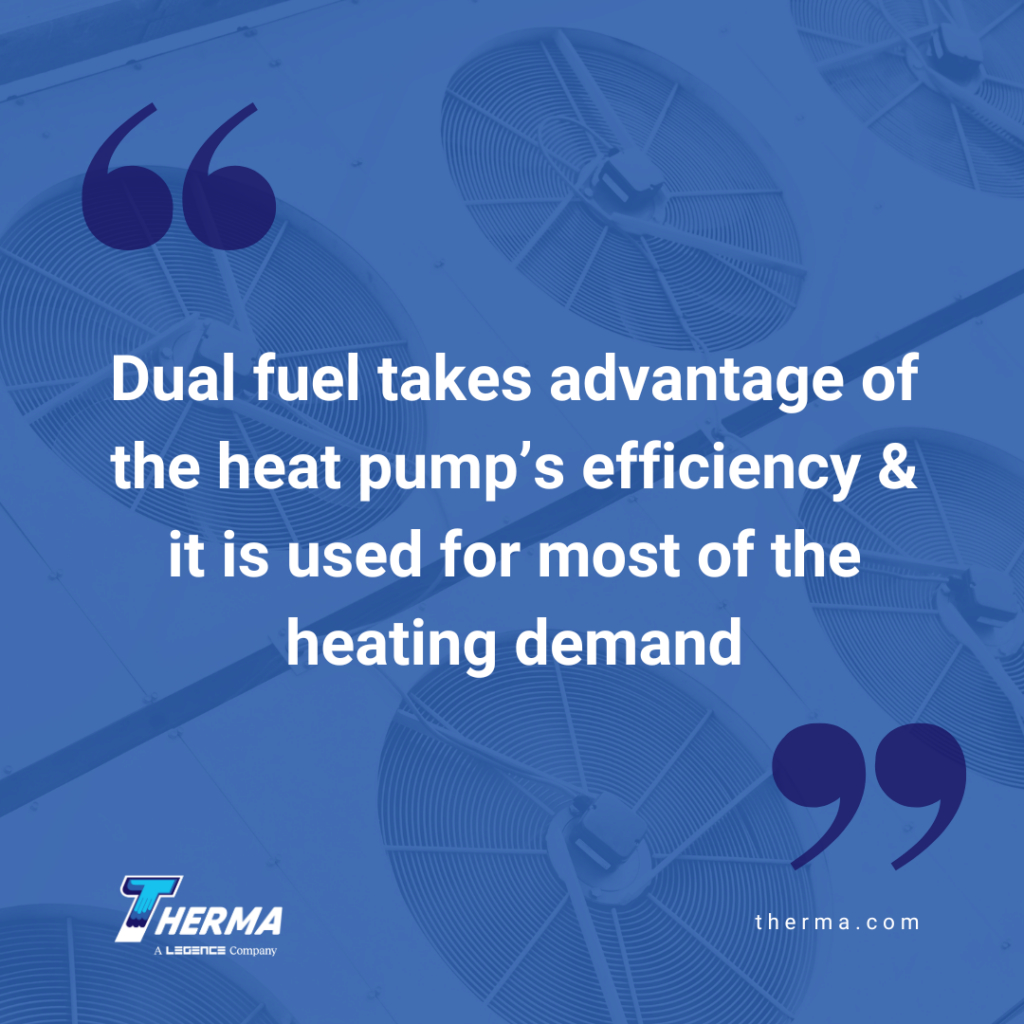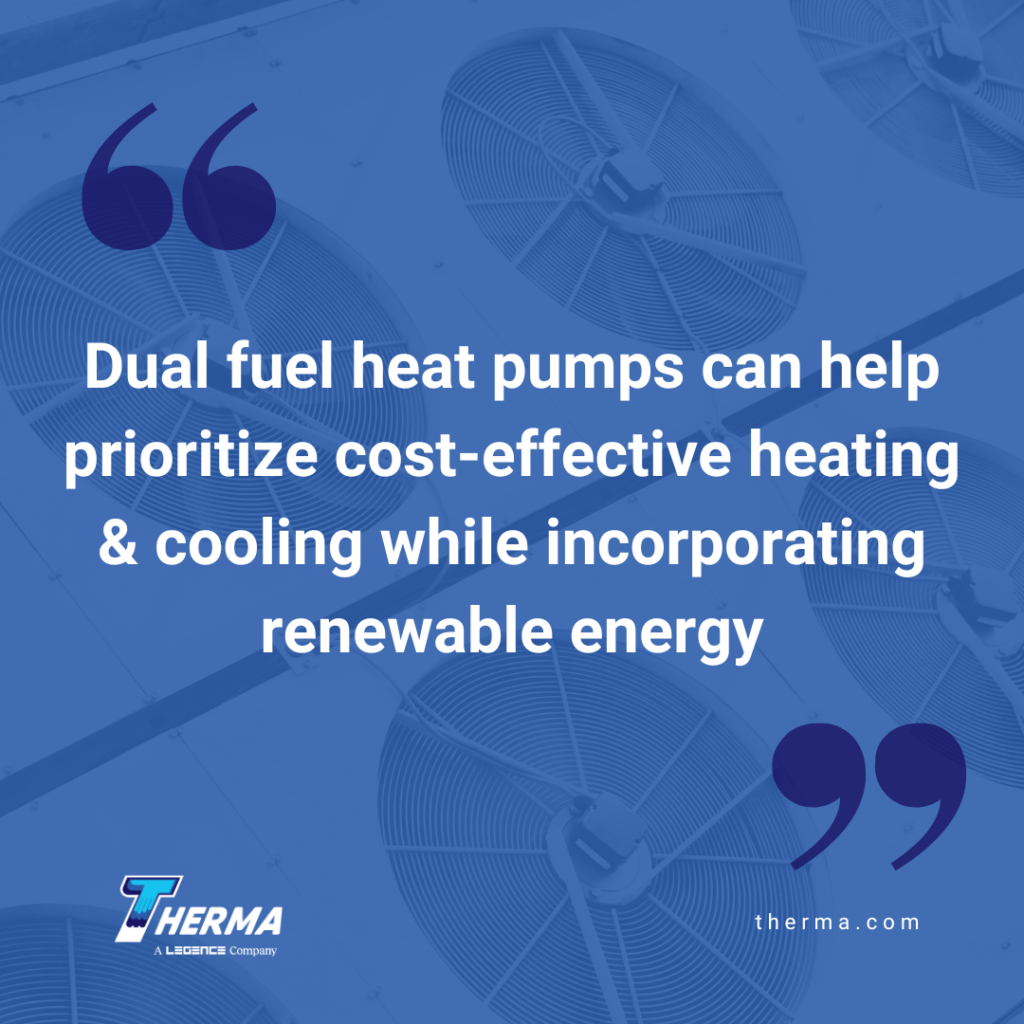by Ali Kriscenski
Heat pumps can be a highly efficient way to heat and cool spaces in many types of climates. In this article, we’ll take a look at how dual fuel heat pumps can be a good solution in applications that have requirements for varying seasonal weather, cost-effectiveness, and energy efficiency. Learn how dual fuel heat pumps can elevate your operational energy performance to meet your goals.
What is a Heat Pump?
Heat pumps are similar to air conditioners in their general functionality. Air-source heat pumps are composed of outdoor units with a fan, condenser, and evaporator, and indoor units with a fan, air handler, and coil. A refrigerant is used to circulate thermal energy between indoors and outdoors to provide heating or cooling.
Heat pumps can be air-sourced or ground-sourced. Geothermal HVAC systems use heat pumps to harness thermal energy underground and redistribute it to conditioned spaces through hydronic radiant heat distribution, typically tubing installed between the subfloors and finished flooring.
The benefit of ground-source heat pumps is that the exterior components are underground and the system is not vulnerable to extreme cold. Traditional air-source heat pumps can be challenged by extreme cold, which is where dual fuel heat pump systems offer resiliency.
How Dual Fuel Heat Pumps Work
Dual fuel heat pumps are efficient systems that combine electric heat pumps and gas, propane, or oil furnaces. This type of system can help prioritize cost-effective heating and cooling while incorporating renewable energy.
Dual fuel heat pumps break from traditional systems that use a furnace as the primary heating mechanism. Dual fuel takes advantage of the heat pump’s efficiency and it is used for most of the heating demand. The heat pump provides thermal comfort for most cold weather, and then the furnace operates as a backup heat source in extreme cold.
Sustainability Benefits
As dual fuel heat pumps operate primarily on electricity, they can be a low-emission HVAC option. For facility managers and building owners, this provides options to integrate a cost-effective HVAC system with onsite renewable energy such as solar PV.
Another green quality of heat pumps is better indoor environmental quality for occupants. Heat pumps do not create a source of combustion or carbon monoxide and they operate with minimal noise. While these may seem like small benefits they can have a big impact.
Indoor air quality (IAQ) is a component of green buildings to benefit the health and wellness of tenants, students, workers, and visitors. Indoor air pollutants can have adverse effects on health, particularly respiratory illness. Long-term exposure can create or worsen chronic health conditions, like asthma. Addressing even small IAQ factors can have a cumulative effect on overall indoor environmental quality resulting in less absenteeism.
Considerations for Dual Fuel
Whether your facility is looking to improve environmental performance or find energy cost savings, a dual fuel heat pump system is worth investigating. Reducing the use of furnace-sourced heating and gas or oil can create opportunities to manage operating costs.
If your facility has onsite renewable energy, like solar PV, then an electric source heating system makes financial sense. Installing a dual fuel heat pump system can reduce fuel usage throughout the year. It can also create resiliency during severe weather ensuring operational continuity.
Incentives for Dual Fuel Heat
Many states as well as the federal government are implementing incentives towards energy efficiency. Because heat pumps are highly efficient and low emission, they are included among the qualifying criteria.
The most comprehensive database for state incentives is DSIRE, maintained by the NC Clean Energy Technical Center. This resource can be a good starting point to research available tax credits and rebates.
Strategic Energy Planning
The best assurance to make a solid energy efficiency strategy is to enlist an HVAC professional with experience in your industry. The experts at Therma understand how schools, offices, and industrial environments operate and can help you integrate, improve, and replace systems with overall performance in mind. Contact Therma today to learn more about dual fuel heat pump options for your facility.
AUTHOR BIO
Ali Kriscenski was trained in high-performance building design at Boston Architectural College. She has worked with leading architecture and construction firms in NYC and New England and served on the executive team at the Forest Stewardship Council International. She was the managing editor at Inhabitat and has worked pro bono for the Green Building Institute, ISEAL Alliance, and Habitat for Humanity.
Sources
EIA – Energy Use in Commercial Buildings
Deloitte – 2023 Renewable Energy Outlook









